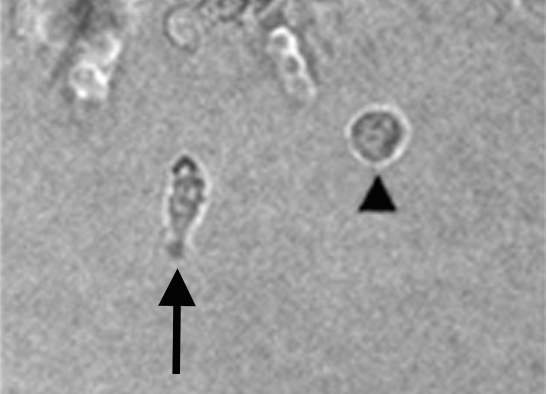Cancer biologists Jessica Konen and Scott Wilkinson, in Adam Marcus’ lab, recently published a paper on the function of LKB1, a gene that is often mutated in lung cancer cells. [Number three behind K-ras and p53.]

Mesenchymal shape is defined as having a length more than twice the width. Amoeboid looks more like the cell on the right: rounded up. Thanks to Jessica Konen for photo.
Konen and Marcus were featured in a prize-winning video that our team produced last year, which discusses how they developed a technique for isolating “leader cells” — lung cancer cells that migrate and invade more quickly — from a large group and studying those cells’ properties more intensively.
The Molecular Biology of the Cell paper covers a related topic: how LKB1 mutation affects cell shape. In particular, losing LKB1 converts lung cancer cells from a “mesenchymal” morphology to an “amoeboid” morphology.Â
LKB1 is a kinase — an enzyme that attaches phosphates to proteins — but the kinase part is not what is critical for the shape change, the paper shows. LKB1 mutation also affects cell adhesion and how the cell remodels the collagen that surrounds it.
In addition to changing cell shape and migration properties, LKB1 mutation seems to affect cell metabolism in distinct ways, which may lead to unique drug vulnerabilities, like to the diabetes drug metformin. As Marcus and colleague Wei Zhou note, “Tumor suppressor genes are not normally perceived as viable drug targets, and a common quote from pharmaceutical companies is ‘How can you target something that is not there?'” Studying LKB1’s effects on cell metabolism might be the way forward.
About the author
Science Writer, Research Communications qeastma@emory.edu 404-727-7829 Office

